17/12/2013 | Writer: Nora Leggemann
On 13th and 14th of December 2013, the 2nd Symposium Against Discrimination was held in Ankara by Kaos GL.

On 13th and 14th of December 2013, the 2nd Symposium Against Discrimination was held in Ankara by Kaos GL. The main title of this year’s Symposium was “The Right to Education”. In 6 panels, 16 people from different countries with different political, academic and professional backgrounds talked and discussed about different subjects connected with the discrimination of LGBT people. In the course of the talks it became very clear how multilayered and complex discrimination in its many forms is. It became also clear, and that was also thanks to the many comments from the diverse audience, how important it is to see heterosexism in connection with other forms of discrimination such as e.g. racism, classism and sexism, and to see the discrimination of LGBT people in connection with the discrimination of other discriminated ’groups’, e.g. Women, Kurds, Armenians and Refugees.
Three points were mentioned repeatedly by the different speakers and therefore became visible as very important for the LGBT movement: 1. The need to connect and to build networks, both within the community and with other minority groups, as well as with heterosexual people and other dominant groups who are willing to support the struggle of LGBT people, 2. The need to „normalize“ LGBT issues by informing people and by becoming visible in all parts of society, so that LGBT issues are no longer a denied, mysterious or strange thing for people. And, last but not least, 3. the need to take concrete action.
Friday, 13. December
The symposium was opened by Sebahat Tuncel from the HDP, who welcomed all participants by pointing out that discrimination is an issue that has to do with all of us and therefore, that everybody needs to fight discrimination, regardless of and in what way a person herself is affected. She concluded her speech with the invitation: “let’s work together, let’s become more, then we will also get stronger!”
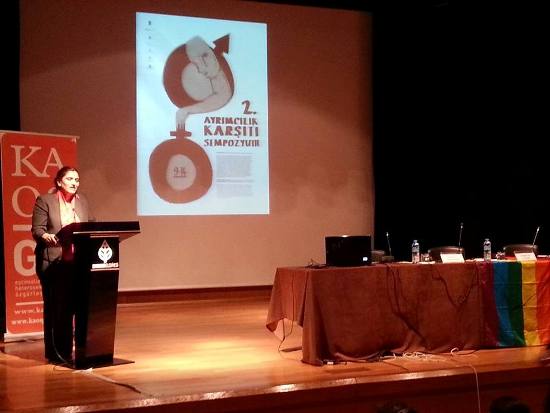
In the first panel, Hüseyin Aygün from the CHP (Turkey) and Dominic Hannigan from the Irish Labour Party (Ireland) talked about their work as parliamentarians and the potential they see in their work to promote change for LGBTs. Aygün stated that parliamentarians who talk about LGBT issues in parliament can help LGBTs to get more visible, and the public to get familiar with LGBT issues. For that, he also mentioned the need to have openly gay representatives in the parliament. Also Hannigan, who himself is an openly gay politician, sees the urgent need for LGBT people to become visible and heard in all parts of society. In his concluding words, he appealed to the audience: “We have the power to do it ourselves, we cannot wait for anybody else to do it.”
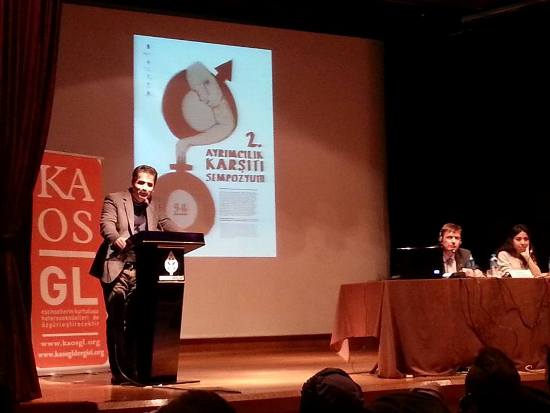
In the second panel, which was titled Struggle and Politics Against Homophobic and Transphobic Discrimination, Sophie Aujean from ILGA-Europe (Belgium), Ulrich Klocke from the Berlin Humboldt University (Germany) and Peter Dankmeijer from GALE (Netherlands) talked about the situation of LGBT students in school. It became clear that bullying is a big problem for many young LGBTs and that in general there is quite a heteronormative and also heterosexist atmosphere in schools. School materials are highly heteronormative and teachers are often not very well informed about LGBT issues in general and their LGBT students in particular. But as Klocke pointed out, attitudes towards LGBTs got better after students and teachers were provided extended information about LGBT issues. In this sense, also Dankmeijer stated that LGBT issues must be more integrated into the school curriculum in order to make them a visible and „normal“ part of people’s lives and realities.
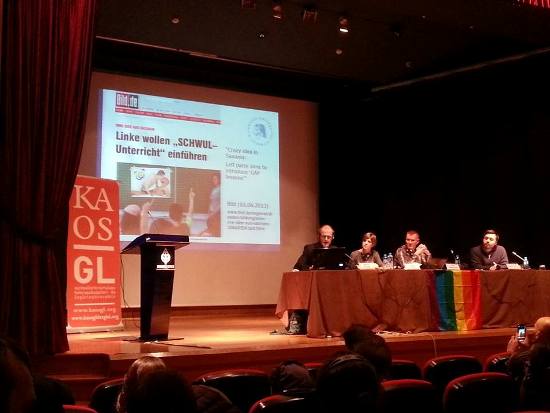
The third panel was titled Sexual Diversity and Recognition of LGBT Students. Michael Barron from BeLonG To (Ireland), Michael Hausermann from Dialogai (Switzerland) and Katarina Stenkvist from RFSL (Sweden) presented the various projects that their organizations conduct with young LGBT people and students in general. It became clear how important it is to work with young LGBTs, for they are both effected by the problems of growing up and special problems of being LGBT in a heteronormative society and their situation is often very precarious, which is e.g. shown by the increased depression and suicide rates. It became also apparent how fruitful the work with and of young people can be, especially when there are alliances between LGBT and heterosexual young people: “young people are important and amazing agents for social change”, as Barron stated. And Hausermann concluded: “it’s better not to be alone and it’s better not to be only LGBT.”
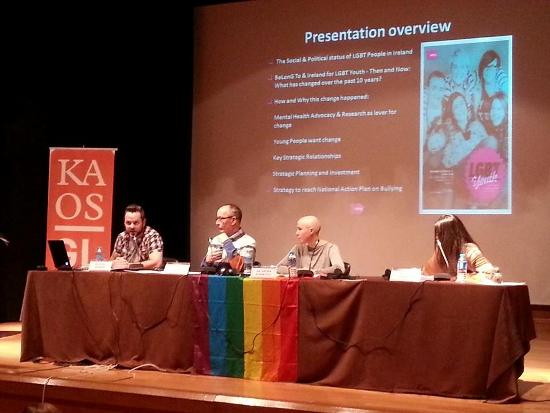
Saturday, 14. December
The first panel on the second day of the Symposiumwas titled Right to the City. Eda Acara from Queen’s University and H. Tarık Şengül and Mehmet Penbecioğulu from Middle East Technical University talked about how (public) spaces are controlled and commoditized by the heteronormative and neo-liberal system and government in power and how important it is to find common strategies to take the right to these public spaces back and, by doing so, to fight the heteronormative and oppressive system. The Gezi protests were mentioned as a good example for collective action and the collective use of spaces.
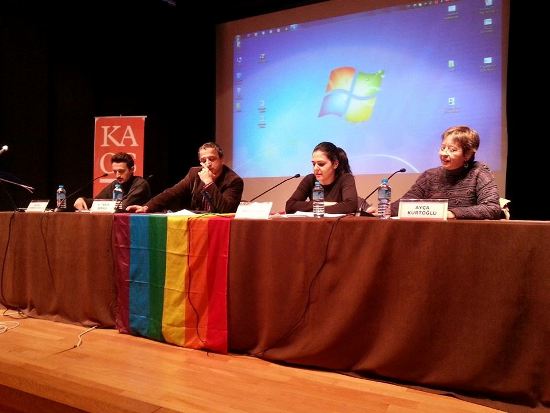
In the second panel Aksu Bora from Hacettepe University and Nilgül Toker Kılınç from Ege University discussed the question Do Rights make us liberated? Bora pointed out that everybody has a right to happiness, which is often being forgotten. Instead, people and movements usually only want the (concrete) rights that other individuals and groups have: “but we have to keep in mind that if the LGBT movement is only asking for the rights that others have, it seeks for something predefined and therefore is limiting itself.” And Kılınç pointed out the urgent need to not only talk: “We need to take (shared) action otherwise we do not realize our potential. It is time for us to take on power.”
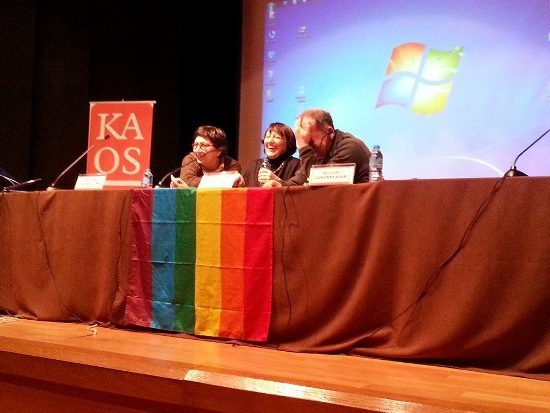
The third and last panel was titled Alternative Politics Against Heterosexist Education. Işıl Ünal from Ankara University, Ayşe Panuş from the Eğitim-Sen (Science and Education Workers’) Union and Zeynep Alat from Ondokuz Mayıs University discussed the current educational system as it is and as it should be. It was stated that education is something very normative and violent in its very nature, for it shapes people according to the existing heteronormative, patriarchal system. It is espeacially violent against people who belong to minorities, for they are shaped by a system that at the same time does not represent them. We need visions for a totally new, free and egalitarian educational system where people can represent themselves.
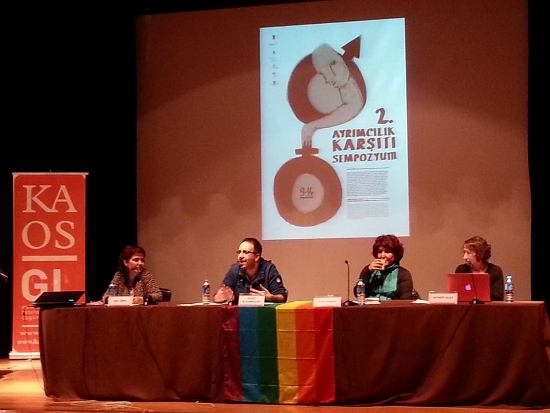
It was an interesting, vivid, informative and inspiring event. Many thanks to all the people who organized it, who gave speeches and who participated by listening, asking questions and discussing the different topics!
The 2nd Symposium is supported by German Embassy, Swiss Embassy, Norwegian Embassy, British Embassy, Irish Labour Party, Sivil Düşün Initiative and SIDA Sweden.
Tags: human rights, education

